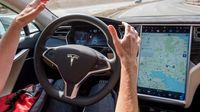In a transformative summer for Britain’s electric vehicle (EV) landscape, two major developments are poised to reshape how commercial drivers charge up and hit the road. First, the UK government has announced an extension of the Plug-in Van and Truck Grants until at least April 2027, giving thousands of businesses and independent drivers a much-needed boost to electrify their fleets. At almost the same moment, a new player is entering the charging scene: Hubber, a startup founded by ex-Tesla Supercharger leaders, is opening its first high-speed urban charging hub in South London, targeting the very commercial vehicles now incentivized to go electric.
These moves come at a pivotal time for the UK’s clean transport ambitions. Commercial vehicles—vans, taxis, delivery trucks—account for more than a third of CO2 emissions on UK roads, according to government data. To tackle this, the government’s grants put money back in operators’ pockets, while private innovators like Hubber are racing to fill the gaps in urban charging infrastructure that could otherwise slow the transition.
On August 18, 2025, the Department for Transport confirmed that the Plug-in Van and Truck Grants, which were set to expire, will now run for at least another year. The grants, part of a broader £650 million scheme under Labour’s Plan for Change, offer discounts up to £2,500 for small vans, £5,000 for large vans, £16,000 for small trucks, and £25,000 for large trucks. The details for the 2026/27 financial year are still under wraps, but the extension delivers much-needed certainty for fleet operators, logistics giants, tradespeople, and even individual drivers considering the switch to electric.
“Extending these grants is another decisive step to power Britain’s transition to cleaner transport while backing the industries that keep our economy moving, driving new investment in EVs and helping businesses cut costs and expand,” said Minister Lilian Greenwood, according to Future of Roads. She emphasized that every new EV on Britain’s roads means “healthier communities and new economic opportunities across the country.”
Industry leaders have welcomed the move. John Boumphrey, UK country manager at Amazon, called the grants “critical” for decarbonizing the transportation network and achieving net zero carbon emissions by 2040. Jambu Palaniappan, CEO of Checkatrade, said the extension is a “big boost for tradespeople across the UK,” noting that lower running costs and freedom from urban charges like ULEZ make electrification more attractive and practical for small businesses. Logistics UK, the industry’s influential trade group, echoed these sentiments but urged government to go further. “Commercial and operational viability will always be the main driver for transport operators and alongside the cost of buying new vehicles, one of the main barriers they still face to fleet electrification is the lack of charging infrastructure,” said Lamech Soloman, the organization’s head of decarbonisation policy.
That’s where Hubber comes in. Born from the ashes of last year’s sudden firing of Tesla’s entire Supercharger team by CEO Elon Musk, Hubber was founded by Harry Fox, Connor Selwood, and Hugh Leckie. The trio, who previously oversaw the rollout of 100 Tesla Supercharger sites with 1,200 chargers across the UK and Ireland, saw an opportunity to address what they call “the urban charging gap.”
Hubber’s focus is squarely on high-powered charging for taxis, delivery vans, and other commercial vehicles that clock far more miles than the average commuter car. According to Hubber, taxis need to charge five times as often as private vehicles—a statistic that underscores the urgent need for reliable, fast urban charging. In cities like London, most drivers can’t rely on home charging, either because they lack off-street parking or simply because street chargers aren’t yet ubiquitous.
“We’re the UK’s leading specialist in urban high-powered EV charging, addressing one of the most urgent constraints in the energy transition: the shortage of fast, reliable charging in major cities,” Hubber states on its website. Their approach is to acquire and redevelop underused urban sites—think old warehouses or defunct petrol stations—into large-scale charging hubs. These sites are designed with commercial drivers in mind: quick in-and-out access, affordable rates, and just enough amenities (restrooms, vending machines) to keep drivers comfortable without slowing them down.
With a hefty £60 million (about $81 million) investment secured, Hubber’s ambitions are matched by its resources. The company’s first facility opens August 20, 2025, at Forest Hill in South London, near Forest Hill Station. The site boasts 12 EV charging bays, including three 150kW and three 300kW dual-head chargers—enough to serve a steady stream of taxis, ride-hailing vehicles, and last-mile delivery vans. For its first week, operator RAW charging is offering free fast charging, a move likely to attract plenty of curious drivers.
Hubber’s vision also looks to the future. The company is already thinking about autonomous vehicles, such as those from Waymo, that may one day roam city streets without drivers. For now, charging these vehicles may require on-site attendants, but Hubber is positioning itself to serve the next generation of urban mobility.
All this comes as the UK government ramps up its own investment in charging infrastructure. In July, ministers announced a £30 million package to install over 3,000 new charge points at depots nationwide. That’s on top of nearly 85,000 public charge points already in place and another 100,000-plus planned through the £381 million Local EV Infrastructure fund. The government is also rolling out the new Electric Car Grant, offering discounts up to £3,750 on 24 eligible models, including recent additions from Cupra, Volkswagen, and Peugeot.
Despite this progress, challenges remain. Logistics UK’s Soloman points out that depot charging alone won’t cut it for most commercial operators, who need a mix of depot and en route charging to keep their fleets running efficiently. He’s also called for a multi-year settlement for the grants, noting that procurement cycles for commercial vehicles can stretch beyond a single year. “Operators need certainty over the long term to plan investments and create confidence required to transition at scale,” he said.
There’s also a call for government to recognize the role of low-carbon fuels—like HVO and biomethane—in the transition, which can provide immediate greenhouse gas savings as the electric infrastructure catches up. Still, the focus remains on electrification as the backbone of Britain’s clean transport future.
For now, the convergence of new government incentives and private innovation like Hubber’s urban charging hubs marks a decisive moment for commercial EV adoption. As more businesses make the switch, and as infrastructure becomes faster and more accessible, the dream of cleaner, quieter, and more efficient city streets edges closer to reality.






